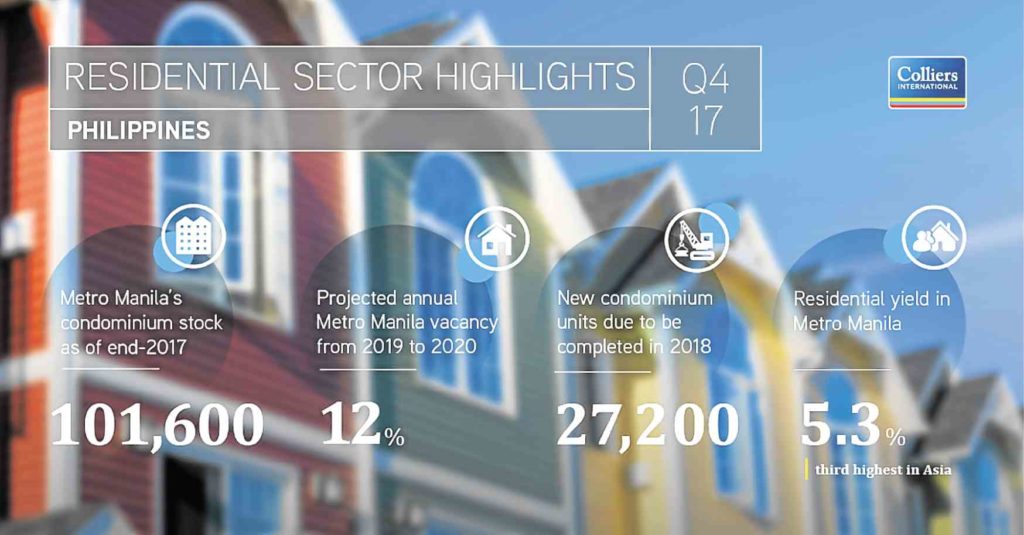Condo take up at a high
Take up of residential condominium units hit a record high in 2017, with Philippine property developers selling a total of 52,600 units, up from the 42,000 units sold in the previous year.
“Take-up of pre-selling condominium units throughout Metro Manila, including fringe locations, reached 52,600 units in 2017, 24 percent higher than the prior year and the highest historically for the country’s capital,” Colliers International Philippines said on Thursday.
According to the residential quarterly report by Dinbo Macaranas, senior research manager at Colliers International Philippines, this growth was partly driven by a “late surge in launches which reached 34,000 units, approximating last year’s total.”
“Additionally, household formation averaged 3 percent annually in the last five years driven by starting families and young professionals,” it added.
The report also showed that the secondary market—or those who rent residential space—“showed resilience as vacancy was virtually flat quarter on quarter at 12.6 percent despite the completions.”
This was primarily due to the delays in construction in the fourth quarter of 2017 and the rental market demand from young professionals. As of end 2017, the Manila Bay Area and Fort Bonifacio have the highest vacancies driven by the size of stock available in these locations.
Rising capital values
The report however pointed out that while prices also rose to record levels given the 24 percent increase in condo take up, rents were “declining or flat at best, due to the combined effect of a double-digit vacancy and the influx of new supply. Naturally, residential yields are declining.”
“Changes from last quarter were within one percentage point away. Prime condominium units in Rockwell Center still commands the highest rental rate averaging P873 per sqm per month. It is followed by Fort Bonifacio at P810 per sqm per month and Makati central business district (CBD) at P803 per sqm per month,” the report stated.
“Albeit marginally, capital values continued to rise. Across key business districts, growth rates ranged between less than 1 percent to as much as 2.5 percent. Colliers attributes this to the strong primary market performance in 2017, which also pushed pre-selling prices to increase between 4 percent and 15 percent quarter on quarter,” it added.
Robust demand
Despite the noted decline in residential yields, Colliers believes that condominium demand, which will come from a mix of end users and investors, will remain robust in 2018 for three main reasons.
For one, Colliers said that Metro Manila still has more attractive rental yields compared with other Asian cities. The country’s capital reportedly ranked third with an average yield of 5.3 percent for luxury apartments, just behind Ho Chi Minh’s 6 percent and Jakarta’s 8 percent.
Data from Colliers showed that Manila’s rental yields were better than Bangkok’s 4 percent, and Singapore’s 2.9 percent, Hongkong and Shanghai’s 2 percent, and Guangzhou’s 1.6 percent.
Positive yields
Colliers further pointed out that when adjusted for inflation, yields have remained positive.
According to the report, yields across CBDs since 2001 were at a high of 9 percent at that time to just below 5 percent today. When adjusted for inflation, returns generally stayed above 1.5 percent—except for 2008 when the sector was hit by the global financial crisis.
“Colliers believes that 27,200 units expected to add to the supply in key CBDs this year would potentially upgrade the options. Couple this with the increased demand from starting families, and the demand from the Chinese communities, we don’t see the decline in rents extending in the medium term. Thus, we believe yields in the local market will still be competitive,” the report added.
Lastly, returns remained attractive and acceptable considering average capital appreciation and bank mortgage rates, according to Colliers.
As such, Colliers urged developers to strategically market their products to be able to take a share of the demand. Location will be key to ensure viable returns for buyers and owners in a market where massive supply exists.
“Yields are more likely to remain attractive in major CBDs, unless an extraordinary event occurs (e.g. financial crisis, sudden change in policies, drastic Fed rate hike). We suggest that potential buyers seriously look at projects in primary CBDs and those in easily accessible surrounding fringe areas as they would offer the best returns for investment,” the property consulting firm added.
As of end 2017, total condominium stock in Metro Manila CBDs reached 101,500 units, 2,900 of which were delivered in the fourth quarter alone. The completions during the quarter were concentrated in Fort Bonifacio and Makati CBD.
For 2018, demand for residential condo units will likely grow by 3 percent while supply is estimated to hit 27,200 units, higher than the 7,500 annual average in the last five years. This is seen to taper off to 8,000 by 2019 and slow down further in the years that follow.
Colliers added that the decline in rents will correct this year as more units in CBDs are delivered and demand from foreign and local employees grows. Increase in rents is estimated at 1 to 2 percent in the short to medium term.

